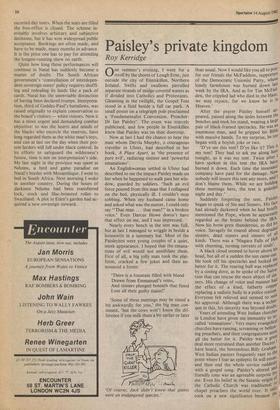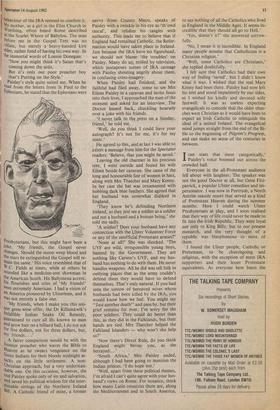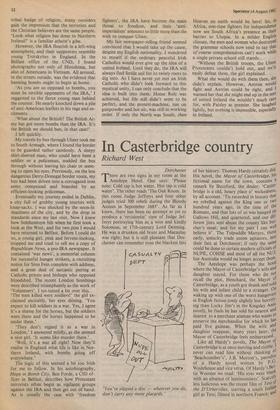Paisley's private kingdom
Roy Kerridge One summer's evening, I went for a stroll by the shores of Lough Erne, just outside the city of Enniskillen, Northern Ireland. Swifts and swallows patrolled separate strands of midge-covered waters as if divided into Catholics and Protestants. Gleaming in the twilight, the Gospel Tent stood in a field beside a full car park. A small poster on a telegraph pole proclaimed a `Fundamentalist Convention. Preacher: Dr Ian Paisley'. The event was scarcely publicised, and few people in Enniskillen knew that Paisley was on their doorstep.
Now at last I had the chance to hear the man whom Dervla Murphy, a courageous traveller in Ulster, had described in her book, A Place Apart, as 'the presence of pure evil', radiating sinister and `powerful emanations'.
An Englishwoman settled in Ulster had described to me the impact Paisley made on her when he happened to walk past her win- dow, guarded by soldiers. 'Such an evil force poured from this man that I collapsed on the bed, physically ill. I couldn't stop sobbing. When my husband came home and asked what was the matter, I could only say "That man ... that man!" in a broken voice.' Even Darcus Howe doesn't have that effect on me, and I was impressed.
Nearly every bench in the tent was full, but at last I managed to wriggle in beside a housewife in a summery hat. Most of the Paisleyites were young couples of a quiet, meek appearance. I hoped that the emana- tions of evil would not annihilate them. First of all, a big jolly man took the plat- form, cracked a few jokes and then an- nounced a hymn: `There is a fountain filled with blood Drawn from Emmanuel's veins, And sinners plunged beneath that flood Lose all their guilty stains!'
`Some of these meetings may be timed a bit awkwardly for you,' the big man con- tinued, `but the cows won't know the dif- ference if you milk them a bit earlier or later
`Of course, Jack didn't know that giants were an endangered species.'
than usual. Now I would like you all to pray for our friends the McFaddens, supporters of the Democratic Unionist Party, whose lonely farmhouse was burned down last week by the IRA. And as for Tim McFad" den, the crippled lad who died in the blaze, we may rejoice, for we know he is in Heaven.'
After the prayer Paisley himself ap- peared, passed along the aisles between the benches and took his stand, wearing a large pair of black-framed spectacles. He was an enormous man, and he gripped his Bible with massive hands. To my surprise, he too began with a boyish joke or two. ‘D'ye see this tent? D'ye like it? This 15 my tent! They had to ask me along here, tonight, as it was my tent. Twice after have spoken in this tent the IRA have burned it down. Each time the insurance company have paid for the damage. NOw nobody will insure this tent any more, and i don't blame them. While we are holding these meetings here, the tent is guarded night and day.' Suddenly forgetting the tent, Paisley began to speak of Sin and Sinners. His face had already darkened when he had briefly mentioned the Pope, whom he apparently regarded as the brains behind the IRA' Now his brow grew thunderous, as did his voice. Savagely he roared about degraded sinners, dead sinners and sinners of 3,1! kinds. There was a `Niagara Falls of Hell with churning, turning torrents of souls'. A black cloud seemed to hover above his head, but all of a sudden the sun came out. He took off his spectacles and looked die, better for it. The roaring bull was replaced by a cooing dove, as he spoke of the Salo' tion that can rescue the most abject of sir!' ners. His change of voice and manner had the effect of a kind, fatherly copper replacing a sadistic bully in a police station' Everyone felt relieved and seemed to see' his approval. Although there was a techal" que in this, his sincerity was beyond doubt. Years of attending West Indian churches in London have given me immunity to sod called 'emanations'. Very many evangelica churches have ranting, screaming or bellow' ing preachers, and their congregations see; all the better for it. Paisley was a great deal more restrained than another Doctor 1 have heard, the horrendous Billy Grahatu' West Indian pastors frequently rant to die point where I fear an epileptic fit will ensue' and then end the whole service suddenly with a gospel song. Paisley's altered an friendly tone was an agreeable surprise Ori. me. Even his belief in the Satanic origin °„ the Catholic Church was traditional to chapel preachers the world over. It 001e took on a new significance because the
behaviour of the IRA seemed to confirm it. My mother, as a girl in the Elim Church in Worthing, often heard Rome described as the Scarlet Whore of Babylon. The man before me in the Gospel Tent was no villain, but merely a heavy-handed kirk elder, rather fond of having his own way. In the immortal words of Lonnie Donegan: `Now you might think it's Satan that's coming down the aisle, But it's only our poor preacher boy that's Putting on the Style.'
Paisley's style quite suited me. When he read from the letters from St Paul to the Ephesians, he stated that the Ephesians were Presbyterians, but this might have been a joke. 'My friends, the Gospel never changes. Should the moon weep blood and the stars be extinguished the Gospel will re- main the same.' His voice resembled that of W.C. Fields at times, while at others he sounded like a medicine-tent showman in the American South. His Ballymena accent, his flourishes and cries of 'My friends!' Were extremely American. I had a vision of an America pioneered by Ulstermen, and it Was not entirely a false one.
'My friends, when I make you this uni- que genu-wine offer, the Dr Killumkwik's Infallible Indian Snake Oil Remedy, guaranteed to cure all ills known to man and grow hair on a billiard ball, I do not ask for five dollars, not for three dollars, but, MY friends...'
A fairer comparison would be with the frontier preacher who waves the Bible to Heaven as he swears vengeance on the Sioux Indians for their bloody midnight at- tacks on the little settlement. A non- Christian approach, but a very understan- dable one. On this occasion, however, the real Paisley spoke only of sin and salvation, and saved his political wisdom for the inter- minable sittings of the Northern Ireland Bill. A Catholic friend of mine, a former navvy from County Mayo, speaks of Paisley with a twinkle in his eye as 'th'owd rascal', and relishes his tangles with authority. This leads me to believe that if England had remained Catholic, the Refor- mation would have taken place in Ireland. Just because the IRA have no figurehead, we should not blame 'the troubles' on Paisley. Many do so, misled by television, which juxtaposes scenes of IRA carnage with Paisley shouting angrily about them, in confusing cross-imagery:
When Paisley had finished, and the faithful had filed away, some to see Mrs Eileen Paisley in a caravan and invite Jesus into their lives, I approached the man of the moment and asked for an interview. The Doctor leaned back, chuckling hoarsely over a joke with his friends.
'I never talk to the press on a Sunday, friend,' he told me.
'Well, do you think I could have your autograph? It's not for me, it's for my sister.'
He agreed to this, and at last I was able to extort a message from him for the Spectator readers: 'Believe, that you'might be saved.'
Leaving the old charmer in his precious tent, I went outside and found his wife Eileen beside her caravan. She came of the long and honourable line of women in hats, along with Mrs Thatcher and Mary Kenny. In her case the hat was ornamented with bobbing dark blue feathers. She agreed that her husband was somewhat disliked in England.
'They know he's defending Northern Ireland, so they just see a soldier as a soldier and not a husband and a human being,' she told me sadly.
'A soldier? Does your husband have any connection with the Ulster Volunteer Force or any of the unofficial Protestant armies?'
'None at all!' She was shocked. 'The UVF are wild, irresponsible young boys, banned by the Government. They are nothing like Carson's UVF, and my hus- band has nothing to do with them. He never handles weapons. All he did was tell folk in outlying places that as the army couldn't defend them they would have to defend themselves. That's only natural. If you had seen the sorrow of bereaved wives whose husbands had been killed by the IRA, you would know how we feel. You might say "Just another death" and pass by, but their grief remains for ever. I'm sorry for the poor soldiers. They could do better than this, as they did in the Falklands, but their hands are tied. Mrs Thatcher helped the Falkland Islanders — why won't she help us?'
'Now there's Direct Rule, do you think England might betray you, as she betrayed....'
'South Africa,' Mrs Paisley ended, although I had been going to mention the Indian princes. 'I do hope not.'
'Well, apart from these political themes, I'm afraid I can't quite agree with your hus- band's views on Rome. For instance, think how many Latin countries there are, along the Mediterranean and in South America, to say nothing of all the Catholics who lived in England in the Middle Ages. It seems in- credible that they should all go to Hell.'
`Yes, doesn't it?' she answered sorrow- fully.
'No, I mean it is incredible. In England many people assume that Catholicism is a Christian religion.'
'Well, some Catholics are Christians,' she replied doubtfully.
I felt sure that Catholics had their own way of feeling 'saved', but I didn't know what it was. I wished that the real Mary Kenny had been there. Paisley had now left his tent and stood impatiently by our sides, so I wished his kindly and devoted wife farewell. It was as useless expecting evangelicals to concede that the older chur- ches were Christian as it would have been to expect an Irish Catholic to relinquish the ideal of a united Ireland. The evangelical mind jumps straight from the end of the Bi- ble to the beginning of Pilgrim's Progress, and can make no sense of the centuries in between.
T can state that most categorically,' I Paisley's voice boomed out across the crowded hall.
Everyone in the all-Protestant audience fell about with laughter. The speaker was not the good Doctor at all, but Gene Fitz- patrick, a popular Ulster comedian and im- personator. I was now in Portrush, a North Antrim seaside resort that served as a kind of Protestant Heaven during the summer months. Here I could watch Ulster Presbyterians at play, and I soon realised that their way of life could never be made to fit into the Irish Republic. They were loyal not only to King Billy, but to our present monarch, and the very thought of a republic was blasphemous to most of them.
I found the Ulster people, Catholic or Protestant, to be churchgoing and religious, with the exception of most IRA supporters and their lesser Protestant equivalents. As everyone here bears the tribal badge of religion, many outsiders gain the impression that the terrorists and the Christian believers are the same people. 'Look what religion has done to Northern Ireland!' is a familiar atheist's gibe.
However, the IRA flourish in a left-wing atmosphere, and their supporters resemble young Trotskyites in England. In the Belfast office of the CND, I found photographs not only of Hiroshima, but also of Americans in Vietnam. All around, in the streets outside, was the evidence that banning bombs ought to begin at home.
'As you are so opposed to bombs, you must be terrible opponents of the IRA,' I suggested to the fierce young man behind the counter. He nearly knocked down a pile of anti-American leaflets in his rage and ex- citments.
'What about the British? The British Ar- my has got more bombs than the IRA. It's the British we should ban, in that case!'
I left quickly.
My travels by bus through Ulster took me to South Armagh, where I found the border to be guarded rather carelessly. A sleepy shirt-sleeved man, who could have been a soldier or a policeman, nodded the bus through without leaving his chair or seem- ing to open his eyes. Previously, on the less dangerous Derry-Donegal border route, my bus had been driven into a corrugated iron army compound and boarded by an efficient-looking policeman.
Eventually my journey ended in Dublin, a city full of grubby young tourists with knap-sacks. I was shocked by the neon-lit sleaziness of the city, and by the drop in standards since my last visit. Now I knew how Solzhenitsyn felt when he first took a look at the West, and for two pins I would have returned to Belfast. Before I could do so, a young girl, pink and fervent-looking, stopped me and tried to sell me a copy of Republican News, a pro-IRA newspaper. It contained 'war news', a memorial column for successful hunger strikers, a recruiting notice for Sinn Fein complete with address, and a great deal of sarcastic jeering at Catholic priests and bishops who opposed bloodshed. The recent London bombings were described triumphantly as the work of 'Volunteers'. I tut-tutted a bit over this. `The men killed were soldiers!' the girl ex- claimed excitably, her eyes shining. 'You expect to kill soldiers in a war. Yes, I agree it's a shame for the horses, but the soldiers were there and the horses happened to be under them.'
`They don't regard it as a war in London,' I answered mildly, as she seemed a nice girl. 'It seems like murder there.'
'Well, it's a war all right! Now they'll realise in England what life is like in Nor- thern Ireland, with bombs going off everywhere.'
The logic of this seemed a bit too Irish for me to follow. In his autobiography, Hope in Bomb City, Ben Forde, a CID of- ficer in Belfast, describes how Protestant terrorists often begin as vigilante groups against the IRA and then get out of hand. As is usually the case with 'freedom fighters', the IRA have become the main threat to freedom, and their 'anti- imperialism' amounts to little more than the wish to conquer Ulster.
My fair newspaper-selling friend seemed convinced that I would take up the cause, despite my English nationality. I wondered to myself if the ordinary peaceful Irish Catholics would ever give up the idea of a united Ireland. Until they do, the IRA will always find fertile soil for its twisty roots to dig into. As I have never yet met an Irish Catholic who didn't look forward to this mystical unity, I can only conclude that the idea is built into them. Home Rule was achieved, but life still didn't seem to be perfect, and the protest-machine, run on gunpowder and hot air, was still in working order. If only the North was South, then
Heaven on earth would be here! So, in Africa, one-time fighters for independence now see South Africa's presence as their barrier to Utopia. In a milder English climate, the men and women who destroyed the grammar schools now tend to say that of course comprehensives can't work while a single private school still stands.
`Without the British troops, the Ulster Protestants couldn't hold out, and we'd easily defeat them, the girl explained.
What she would do with them then, she didn't explain. However, Antrim would fight and Antrim could be right, and I warned her that she might end up in the sort of united Ireland she wouldn't much care for, with Paisley as premier. She laughed lightly, but nothing is impossible, especiallY in Ireland.




































 Previous page
Previous page